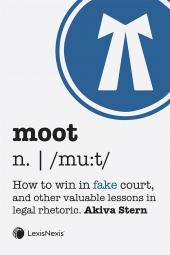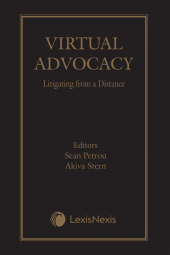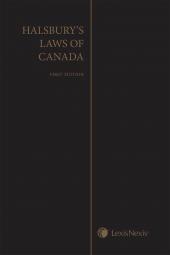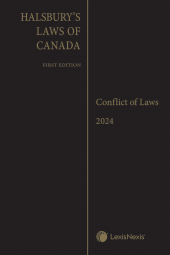Moot: How to Win in Fake Court, and Other Valuable Lessons in Legal Rhetoric
This unique book explores the how-to of mock trials, the experiential learning component of law school, offering valuable guidance and input from experienced students.
One Year Subscription Only Terms
Subscribers receive the product(s) listed on the Order Form and any Updates made available during the annual subscription period. Shipping and handling fees are not included in the annual price.
Subscribers are advised of the number of Updates that were made to the particular publication the prior year. The number of Updates may vary due to developments in the law and other publishing issues, but subscribers may use this as a rough estimate of future shipments. Subscribers may call Customer Support at 800-833-9844 for additional information.
Subscribers may cancel this subscription by: calling Customer Support at 800-833-9844; emailing customer.support@lexisnexis.com; or returning the invoice marked 'CANCEL'.
If subscribers cancel within 30 days after the product is ordered or received and return the product at their expense, then they will receive a full credit of the price for the annual subscription.
If subscribers cancel between 31 and 60 days after the invoice date and return the product at their expense, then they will receive a 5/6th credit of the price for the annual subscription. No credit will be given for cancellations more than 60 days after the invoice date. To receive any credit, subscriber must return all product(s) shipped during the year at their expense within the applicable cancellation period listed above.
Product description
"A unique combination of practical tips and academic pursuit. There is something in this book for everyone and some very useful assistance for first time mooters."
Norman Bacal
Mentor and Bestselling author of Breakdown and Take Charge
As litigator and author Akiva Stern states in the opening chapter of this new publication, “[m]ooting is a skill that does not come naturally to most law students. Rather, it is a function of continuous training and thought, so that one can apply oneself in a more proficient manner.” To help students with this process, Stern – himself an experienced and recognized mooter – spent several years conducting research and interviewing other competitive mooters on a national and international level with the goal of developing a guide to help law students with their mock trial experiences and to provide insight to the legal profession at large into the world of rhetoric and argumentation. Moot: How to Win in Fake Court, and Other Valuable Lessons in Legal Rhetoric is the result of those efforts.
A Much-Needed Resource
Divided into two main parts, this handbook offers guidance on both major aspects of mooting: formulating substantive arguments and delivering those arguments persuasively.
The section on substantive arguments focuses on breaking down the essential components of rhetoric. Each chapter builds on the previous one by offering a principle, discussing the generic logic behind it, applying it to the mooting setting, and then finishing with a case analysis.
The other section is based on qualitative research compiled from 30 hours of interviews, amongst 22 competitive mooting students from the Faculty of Law at the University of Windsor during which they shared their insights on mooting culture and what they learned from their experiences. In this section, Stern explores a range of topics, including confirmation bias and developing a mooting identity.
Moot: How To Win in Fake Court, and Other Valuable Lessons in Legal Rhetoric would be a useful resource for:
- First year law students taking legal research and writing and those who are participating in the moot program
- Upper year law students who are competitive mooters
- Students enrolled in: political science courses that focus on rhetoric and argumentation; negotiations, rhetoric and argumentation studies; and business negotiations/communications/dispute resolution courses, particularly at the J.D./M.B.A. level
- Academics can use it as a reference to help inform their understanding of the logic behind the rules of evidence and how they might apply to a given circumstance
- Associations that promote advocacy amongst their members will find this volume to be a useful addition to their library
Table of contents
Part I: The empowered advocate
Chapter 1: The language of rhetoric in law: A battle of ideals
Part II: On rhetoric and argumentation
Chapter 2: Historical development of law: Law and morality
Chapter 3: Normative vs. descriptive arguments: There is always a side
Chapter 4: How lawyers measure: Where the opposite of no isn’t yes
Chapter 5: How lawyers measure II: When the price is right
Chapter 6: Differentiating rules: This is not a lion, it is a lion with a hat
Chapter 7: Argumentum a fortiori: The higher you fall, the harder you hit the ground
Chapter 8: Understanding argument scope: All expensive cars are Ferraris
Chapter 9: Counterfactual thinking and alternative consideration: Don’t turn on the hand dryer, for surely the campus will burn down
Chapter 10: Policy arguments in appellant level mooting: The legal system is like a beehive
Part III: Mooting psychology
Chapter 11: On mooting psychology: What are you worth?
Chapter 12: Fear and anxiety: Say, “I think I can, I think I can” and open a nice bottle of pinot
Chapter 13: Mooting style, part I: Personality and self-concept
Chapter 14: Mooting style, part II: Creating a mooting style
Chapter 15: Confirmation bias: The believability factor
Chapter 16: Form vs. substance: The ideal and the beautiful
Chapter 17: Moot team dynamics: Creating a shared mind
War stories and anecdotes
 Lexis Nexis
Lexis Nexis 



